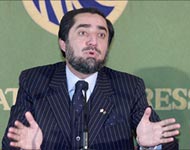Afghanistan wants Pakistan action on Taliban: Abdullah
Afghanistan’s Foreign Minister Abdullah Abdullah alleged Taliban leaders were still operating in neighbouring Pakistan.
Afghanistan’s Foreign Minister Dr Abdullah Abdullah called on Pakistan Saturday to act against Taliban leaders he said were operating from its territory.
Abdullah said the shadowy head of the Taliban, Mullah Mohammed Omar, topped a list of those believed to be taking refuge in Pakistan.
 |
|
Afghanistan Foreign Minister |
Speaking ahead of a visit to Afghanistan on Sunday by U.S. Defence Secretary Donald Rumsfeld, Abdullah said anything that went against U.S.-led efforts to improve security in Kabul was a cause for concern.
Afghan leaders have drawn up a list of senior members of the former Taliban regime they claim are operating from Pakistan, the country that was the main backer of the group until the attacks on the United States on September 11, 2001.
“Of course, Mullah Omar would be at the top of the list,” Abdullah told Reuters in an interview. “And some of the Taliban leaders are not just hiding, they are living there.”
Abdullah said they included commander Akhtar Mohammad Usmani, a close confidant of Mullah Omar, and Mullah Turabi, a former justice minister who created the feared Taliban religious police.
The minister said that during a visit to Islamabad by Afghan President Hamid Karzai last week, Pakistan had promised to cooperate in the battle against remnants of the Taliban ousted in late 2001, who have stepped up attacks against government forces
and a U.S.-led coalition in recent months.
“We hope that we will see some results,” he said.
“What we are expecting from Pakistan as a neighbourly country and a country that we have established friendly relations with is to focus more on those fields. We are certain that with more focus we can have better results.”
Asked if he thought it was the policy of Pakistan’s President Pervez Musharraf — a key ally in the U.S.-led “war on terror” — to protect Taliban leaders, Abdullah replied:
“The official policy, the public policy of the government of Pakistan, is support for the government of Afghanistan…That’s the official policy, but I think certain action needs to be taken with regard to those people who are living there.”
Abdullah said it was clear Taliban leaders allegedly living in Pakistan were involved in attacks in Afghanistan.
“They are not there just drinking tea; they are active in creating insecurity in Afghanistan.”
Abdullah said this had been recognised in meetings with Pakistan and he hoped Islamabad would now show “the same vigour and enthusiasm” in pursuing the Taliban as it had in arresting members of al Qaeda, the allied network led by Osama bin Laden blamed for the September 11 attacks.
Abdullah said he hoped Rumsfeld’s visit would provide a boost in the fight against Taliban and al Qaeda remnants which is spearheaded by a 11,500-strong U.S.-led coalition
“I am sure the visit of the secretary will help the American military as well as our people overcome these challenges.”
Abdullah said Rumsfeld’s trip, following recent visits by other senior U.S. figures, was evidence Washington had not lost sight of Afghanistan. “The visit has this important message of continuing focus on Afghanistan,” he said.
While security would be the dominant issue, Abdullah said Afghanistan was looking for further cooperation in the rebuilding of infrastructure and also in the energy sector.
Referring to stuttering U.S.-led efforts to help establish a new national army, something vital to extending the government’s authority outside of Kabul but still only a few thousand strong, the minister said:
“What is needed is more focus and more attention to that field. We all know that…stability in our country will rely on our efforts in that area.”